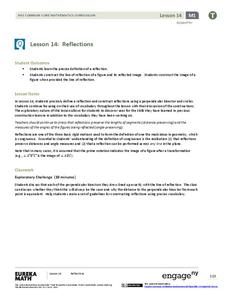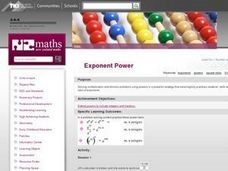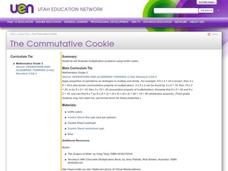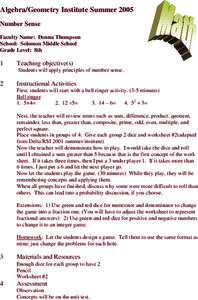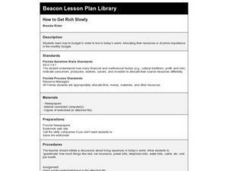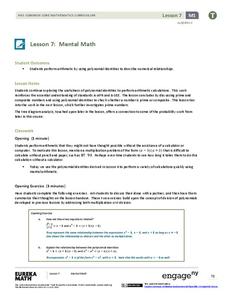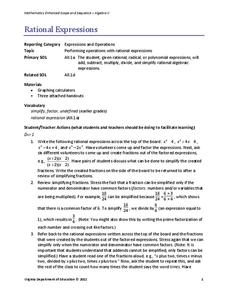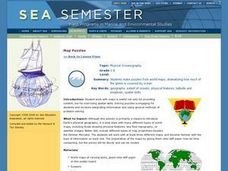EngageNY
Reflections
Facilitate creativity in your math class as individuals learn the definition of a geometric reflection and correctly construct a model, as well as its reflected image. They use a perpendicular bisector and circles to elaborate on...
Curated OER
Learning About the Globe
Young scholars examine the following terms to increase their geography skills: globe, equator, prime median, Western Hemisphere, Eastern Hemisphere, Northern Hemisphere, Southern Hemisphere, Pacific Ocean, Atlantic Ocean, and The United...
Curated OER
Hemispheres & Continents
Students learn in cooperative learning groups to determine how the equator and the Prime Meridian divide the earth into hemispheres and use Venn diagrams. Students will locate and label the hemispheres, continents, and oceans.
Curated OER
Clock Arithmetic and Cryptography
Learners perform basic operations in modular (clock) arithmetic. Students encode and decode messages using shift and affine ciphers. Learners apply their multiplication, division, addition, and subtraction skills.
Curated OER
The Voting Game
Students examine and discuss the Canadian electoral process. They conduct a simulation of the electoral process, with students running as candidates, holding a convention, campaigning, and voting for Prime Minister of the Day.
Curated OER
Exponent Power
Students explore multiplication and division problems using exponents. Students examine positive, negative and zero powers. They relate powers to geometric sequences. Students devise strategies and discover rules of exponents.
Curated OER
Documents Related to Churchill and FDR
Students groups divide up into 2. One gathers 10 facts about FDR and the other gathers 10 facts about Churchill. On the board, they compile that facts gathered in two separate columns so they can compare and contrast these two men.
Curated OER
The Commutative Cookie
Third graders investigate the commutative properties of multiplication and focus upon the setting of cubes in the correct patterns to solve problems. They differentiate between numbers that have multiple factors and prime numbers....
Curated OER
Square Roots
Students differentiate between perfect roots and rational roots. In this algebra lesson, students perform operation using roots. They add, subtract, multiply and divide rational expressions.
Curated OER
Number Sense
Eighth graders participate in a lesson that is concerned with reviewing basic math concepts using the four operations. The activity is composed of a math game that is played by them.
Curated OER
What if the Senate were Reformed on the Triple E Model
Students investigate what the Canadian Senate does and what reform would do to the power relationship between the Prime Minister and the Senate.
Curated OER
How to Get Rich Slowly
Fourth graders discover how to budget in order to live in today's world. Allocating their resources is of prime importance in the monthly budget. They utilize a worksheet imbedded in this plan to figure out their monthly budget.
Curated OER
"Exploring U.S. Motives Behind WWII Imprisonment and Deportation of German, Japanese, and Italian Latin Americans"
Students research and examine the secret Special War Problems Division program in Latin America and discuss the impact of the program on civil and human rights. They assess the motives for the program and explore various quotes from that...
Curated OER
Let's Make Waves
Young scholars investigate the concept of waves and how they are formed. The force of wind is demonstrated as the prime factor to the creation of ocean waves. Students research the concept in detail for better comprehension.
Willow Tree
Factoring Polynomials
Young mathematicians discover trees organize more than just families — they help factor, too. The lesson begins with factor trees and develops slowly to factoring by grouping and special patterns.
EngageNY
Mental Math
Faster than a speedy calculator! Show your classes how to use polynomial identities to multiply numbers quickly using mental math.
Illustrative Mathematics
Equivalent fractions approach to non-repeating decimals
Trying to get your class to think of decimals as fractions and vice versa can lead to interesting discussions. After all, we can usually understand quickly that 1/4 is .25 but why is 1/7 not so easy to convert? This activity looks...
Virginia Department of Education
Rational Expressions
Demonstrate the progression of operations with rational expressions through a multi-day lesson, equipped with worksheets for each day. High schoolers develop the concepts needed to perform operations with rational expressions....
Curated OER
Map Puzzles
Students make puzzles from world maps, dramatizing how much of the globe is covered by ocean.
Beacon Learning Center
Ten Pins
Multiplying with multiples of 10, 100, and 1,000 provides an opportunity to discuss patterns that arise with zeros. The class uses these patterns to solve problems. Then they rotate through three work stations, including a computer-based...
Curated OER
Discovering New Units
Students use Cuisenaire rods to explore common denominators. In this fractions lesson, students build Cuisenaire representations of fractions, then find their equivalent counterparts to find the common denominator.
PBS
Add, Subtract and Multiply Fractions
Your future chefs will appreciate this comprehensive instructional activity where learners practice operations on fractions using pizza and soup analogies. Learners begin with a pizza analogy that requires the learners to...
Curated OER
Perfect Numbers
Sixth graders classify numbers as abundant, deficient, or perfect based on the relationship between the number and its factors. They review factor game using the completed lab sheet. When playing the factor game which type of numbers...
